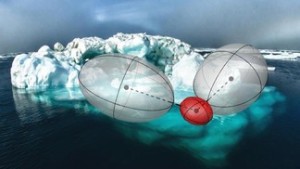Oct 15 2013
The idea that the quantum mechanical behavior of light atoms can be decomposed in different components, and that these components tend to cancel out each other leaving a small net effect has been around for some time in theoretical simulations of hydrogen-bonded systems. Now a combined experimental/computational study provides direct evidence by decomposing the changes in quantum kinetic energy upon melting in heavy water.
 © 2013 EPFL
© 2013 EPFL
Small subatomic particles such as electrons must be described by the laws of quantum mechanics in order to obtain accuracy in computer simulations. Heavier nuclei, instead, behave pretty much as macroscopic objects, following the laws of classical mechanics - at least at ambient conditions. Light nuclei such as hydrogen are somewhat in intermediate grounds, displaying significant deviations from a purely classical behaviour.
Nevertheless, the impact of these quantum effects on macroscopic properties such as the melting temperature of water is farly limited, as it is evidenced by the small isotope effect upon H/D substitution. Several theoretical studies in the last few years have introduced the concept of "competing quantum effects" to explain how the quantum behavior of hydrogen can be decomposed along different molecular axes, and that cancellation between the changes in these components is responsible for the small overall effect.
In a recent paper published on J. Phys. Chem. Lett., this cancellation has been observed in what is perhaps the most direct experimental way, by decomposing the quantum kinetic energy of deuterium atoms along different directions, and observing how these components change when heavy water melts. These experiments were supported by atomistic simulations, and are also discussed in less technical terms in an entry on phys.org.